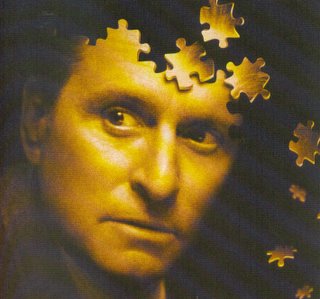Significant Cinema Series: THE GAME

I thought I would occassionally post a review of an older film that really holds-up for me. These will be movies that I think are worth owning, movies that matter. Here's the first. It's one of my favorite movies of all-time.
THE GAME, directed by David Fincher, Polygram, 1997
"You want to know what it is? What it's all about?
John. Chapter nine. Verse twenty-five."
John. Chapter nine. Verse twenty-five."
Millionaire Nicholas Van Orton (Michael Douglas) is a man who actually thinks he lacks nothing in life. He has everything. Above all, he is in control. From multi-million dollar business deals to phone calls from his ex-wife, Van Orton controls every facet of his well-ordered life. An unanticipated visit from his estranged brother changes all of that.
Van Orton is just "Nickie" to his younger brother Conrad (Sean Penn). Early in the film we witness their luncheon reunion. It's the first time they have seen each other since their mother's death four years before. Nick's expressions show us that he despises Conrad; he expects his flaky brother to ask for a handout. Likewise, Conrad thinks Nick's mansion is "the house of pain." And, that's an apt title given that their affluent father committed suicide there by plunging off the roof (an event we see via flashbacks). The elder sibling is surprised that his brother initiated the visit merely to give "the man who has just slightly more than everything" a birthday gift. A gift certificate from Consumer Recreation Services (CRS) is presented. Conrad promises Nick "a profound life experience."
Despite reservations, Nick is intrigued by the company's self-described "game." At their local headquarters, he is subjected to a battery of tests. Later, in a follow-up telephone call from CRS, Nick is told that his application has been rejected. Nick is incensed, but doesn't connect the dots. At his initial meeting he was told that CRS provides a person with "whatever's lacking" in their life. What's lacking in his life is frustration, rejection, uncertainty, danger, insecurity, and above all, humility. He's oblivious to the fact that those things are missing, but Nick is about to learn them. Thus, unbeknownst to him, with the words, "Your application has been rejected," his game has already begun.
To say the game is a nightmare would be an understatement. Like Nick, the moviegoer is left guessing. Lines between reality and fantasy are not just blurred, they are indistinguishable. The director, David Fincher, is a master at placing characters in vexing situations and bleak locations. Both of those elements are present here. Part of the film is shot on location in Mexico. That sequence alone is such a fundamental moment in the breaking of Nicholas that one could analogize it to a descent into hell.
The central theme of the movie is crystallized by a character identified in the screenplay simply as "Businessman 2" (see the introductory bolded quote preceding this review). Uttered after a time cut that takes us to an interior shot at an athletic club, the quote is the centerpiece of the film. Despite the fact that it is not veiled at all, many miss the biblical reference.
"I was blind, and now I can see."
--John 9:25
--John 9:25
Like the blind man healed on the Sabbath, Nick is made well by his brother's gift. Indeed, the game is Nick's "Road to Damascus" experience and a case can be made for Conrad as the Messiah who leads his brother to salvation. Just as Christ knew that Saul required a dramatic conversion experience, Conrad grasped the severity of Nick's situation: Only a confrontation with blindness could bring about a change. Or, as a good friend of mine says, "It takes an awful lot of humiliation to get a little humility."
"I had to do something; you'd become such an asshole."
--Conrad Van Orton
In the great tradition of Frank Capra's IT'S A WONDERFUL LIFE, Fincher's THE GAME is a remarkable variation of "the blinders are off" story. Like George Bailey before him, Nicholas Van Orton is a despairing man who greatly needs to be shown the light. Bailey's finances were kaput whereas Van Orton had a bankrupt soul. The only difference between the two is that Nicholas was unaware of his desolation. However, in the end, the gratitude Nick wears on his face shows us that he recognizes just how bleak things had become. Is it any wonder that we don't see Nick really concerned for anyone other than himself until after he's been saved?
Reviewed by Shenandoah Lynd
Photo copyrighted: Polygram Filmed Entertainment, Inc., 1997
--Conrad Van Orton
Thus, if Conrad is not a type of messiah figure, he is at minimum an Ananias used to restore sight to Brother Nick (see Acts 9:12-18).
In the great tradition of Frank Capra's IT'S A WONDERFUL LIFE, Fincher's THE GAME is a remarkable variation of "the blinders are off" story. Like George Bailey before him, Nicholas Van Orton is a despairing man who greatly needs to be shown the light. Bailey's finances were kaput whereas Van Orton had a bankrupt soul. The only difference between the two is that Nicholas was unaware of his desolation. However, in the end, the gratitude Nick wears on his face shows us that he recognizes just how bleak things had become. Is it any wonder that we don't see Nick really concerned for anyone other than himself until after he's been saved?
Reviewed by Shenandoah Lynd
Photo copyrighted: Polygram Filmed Entertainment, Inc., 1997
Labels: film


2 Comments:
Oh man....THE GAME!!! Has Lombrano seen this post yet? I expect a LENGTHY comment from him. Good insight on the film. Bring on your FIGHT CLUB review..another classic Fichner film.
I want to see it again. That movie made me NUTS! I'm thinking, "No way, this can't be happening! That's impossible! How'd they do that, know that, expect that?!?!" All that though, from my limited set of eyes.
Our group went through a great book last year, God In The Movies, and THAT opened my eyes a lot. Interestingly, THE GAME wasn't in it. It's amazing though, how God's story shows up in cinema. Could have a whole blog on just this...
Post a Comment
<< Home